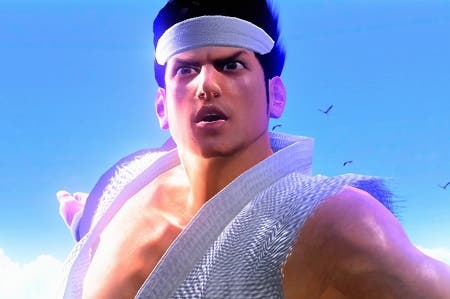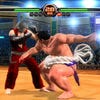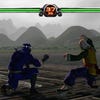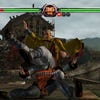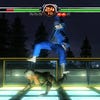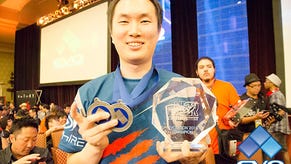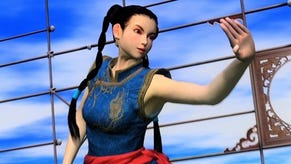Virtua Fighter 5 Final Showdown Review
Last hurrah.
For all of its achievements in the 19 years since it was born via a partnership between Lockheed Martin and Sega, AM2's Virtua Fighter series has never received the wider praise it deserves. One of Yu Suzuki's most enduring creations once christened every round of new arcade hardware, was a pioneer in 3D graphics and helped establish online fighting. All the while, beneath those achievements emerged a game of exceptional depth and nuance.
There's an understated elegance to the series, and beyond the signature shiny plastic Sega patina, there's even a certain restraint to Virtua Fighter's sparring. The showiness and immediate spectacle of 2D fighters such as Street Fighter is absent, the fireworks and extravagant kitsch of fellow 3D brawlers like Tekken and Soul Calibur nowhere to be seen. In its place is combat that, while far from realistic, is a perfect tangle of real-life fighting styles painted with a wash of subtle flair.
The lucha libre of El Blaze, a mix of cocky throws and showy beat-downs, can face off against the stuttered acrobatics of Eileen's monkey kung fu or the staggering artistry of Shun Di's drunken fighting; and as ever, Virtua Fighter's greatest trick is how it brings together such disparate techniques in what's surely the fighting genre's most exquisite balancing act.
It's an act that's not exactly alien to consoles. Sony's PlayStation 3 played host to Version B of the arcade version of Virtua Fighter 5 in 2008, while a handful of months later the Xbox 360 got Version C as well as the all-important inclusion of online play. Virtua Fighter 5 Final Showdown is a download-only port for both consoles of a 2010 arcade update that, the name suggests, is the end of the line for this particular strand of AM2's series.
So what's changed? Final Showdown saw Virtua Fighter 5 move from Sega's Lindbergh board to its more modern RingEdge hardware, with the benefits trickling down to this belated console outing through the slightest of boosts in graphical detail.
Any visual improvements are largely moot, though. There's an ageless charm to Virtua Fighter 5's aesthetic that ensures that Final Showdown rarely shows its years, and it's all hammed up by Sega in some delightful ways; voice acting is hilariously strained and overstated and there's an intentional distortion on the announcer's voice that makes even the crispest audio system sound like it's a beaten-up cabinet in some dark corner of a Shibuya arcade.
Two new characters are also introduced, with sumo wrestler Taka-arashi returning after an extended absence and the exhaustive, charged karate of Jean Kujo making its series debut. More enclosed arenas make for fights that are more mindful of their environment - it's long been possible to bounce players between a fist and a wall, but it's now a more pronounced tactic, with different arenas explicitly imposing different approaches. Some new moves make the most of this, and throws executed whilst perched atop a half-wall or athletic wall-runs will now be a bigger part of a fighter's vocabulary.
There are also more defensive options, and importantly more readily available lines of defence for upstart players. On the flipside, each character's been kitted out with a suite of new attacks to bring the balance back. As a result, after an initial period of recalibration, the fighting simply feels broader, rather than skewed in any one direction. And balance is something that Final Showdown boasts in excess, an unlikely and artful symmetry having been struck between its extended roster.
Virtua Fighter's always been a series of slow, considered steps, one that's happy to admit that it deals in evolution rather than revolution with each iteration being only a double-tap of the stick away from its predecessors. But evolution's a wonderful thing, and in Virtua Fighter 5 Final Showdown we've got the fittest, most wily and intelligent of fighters, and one that's adapted in tune to its small, dedicated community.
For the newcomer, it's a slightly different story, but it's worth putting to bed the myth that this is one of the more impenetrable games in the genre. With a mere three input commands, the fundamentals of Virtua Fighter are an exercise in simplicity. Its command chains are not subject to twisting inputs but rather rely on position and timing.
Like previous installments, Final Showdown does its very best to open its intricacies up to newcomers. The Dojo's a perfect training ground where you're guided through each and every command and there's a more proactive form of education in the License Mode, wherein a slog through the character list is supplemented with various challenges: block five punches, say, or work a handful of counters into your attack. As a primer for the deeper, wider world of Virtua Fighter it's indispensable, though it still requires severe dedication to bridge the huge rift between mere competence and being a half-decent fighter. It's a rift that tears through much of this port of Final Showdown.
With a price of 1200 Microsoft Points on Xbox 360 and £9.99 on PlayStation 3 (currently free to all PlayStation Plus subscribers), it's a relatively painless introduction to the world of Virtua Fighter, though the base package is sparse - the Quest mode that formed the backbone of previous console outings has been stripped out.
For a few dollars more, customisation packs can be purchased, unlocking the ability to play a game of dress-up with the characters that threatens to run as deep as the main event. It's a canny move from Sega, opening up the game for all while ensuring that more dedicated players will end up paying the equivalent of a full-priced boxed game.
Online, the rift is not so easy to cross, and goes to show the large gap that exists between the casual and the committed. The fundamentals of networked play are solid and surprisingly forward-thinking, with character select being locked down before you come up against an opponent and control settings being placed front and centre of pre-match screens, rather than being ferretted away in some menu.
It's an unfortunate truth, though, that beyond the approachability of Virtua Fighter's fundamentals there's a rock-face to be climbed for players new to the series, and that they may be sent packing from a competitive online scene to an offline mode that's got very little to offer.
A shame, as while the game demands dedication, it offers riches in return; there's an organic rhythm to its fighting that's tough to tame but that, in its depth and in its breadth, allows for a level of personal expression that's unique to the series. Virtua Fighter may no longer be at the cutting edge, but Final Showdown proves that it still runs deeper than any of its peers.
